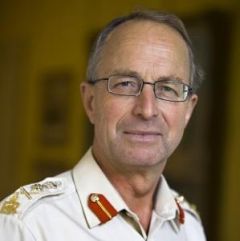“Argentina plotting a mock fishermen’s Falklands’ invasion” says UK media
A British newspaper revealed that the UK Prime Minister’s accusations of ‘colonialism’ against Argentina came after being warned that “Buenos Aires was plotting a mock fishermen’s invasion” of the Falkland Islands.
 Chief of the Defence Staff General Sir David Richards reassured PM Cameron UK can defend the Islands
Chief of the Defence Staff General Sir David Richards reassured PM Cameron UK can defend the Islands
According to the Daily Mail newspaper, Cameron’s accusations came as it emerged that the Ministry of Defence has a ‘contingency plans’ in place enabling troops to be deployed swiftly in an emergency to the Malvinas via Ascension Island.
The tabloid indicates that British Ministers were shown plans drawn up to combat a campaign of intimidation planned by Argentina to mark the anniversary of the 1982 conflict, during a National Security Council summit hosted by Cameron days ago devoted to the defence of the Islands.
Cameron was warned at the meeting of intelligence showing that Argentine fishermen could be sent to land on the Falklands and the island of South Georgia to plant an Argentine flag.
The mock invasion fears have echoes of the 1982 conflict which began when an Argentine force landed on South Georgia, which was defended by a small company of UK’s Royal Marines.
UK Chief of the Defence Staff General Sir David Richards has already outlined Britain’s contingency plans and reassured Cameron that Britain can defend the Islands.
But ministers and spy chiefs warned the Prime Minister that Argentine President Cristina Fernández will use the 30th anniversary as the pretext to ‘raise the temperature’.
At the NSC summit, Cameron led a series of war game discussions about how to respond to a series of provocations by Argentina. The NSC agreed that the Falklands’ police – rather than the Armed Forces – would be used to combat a flag-planting stunt by the Argentines.
The alleged Argentine plot brings to memory the Western Sahara incident between Morocco and Spain. In spite of a ruling from the International Court or Justice, Morocco insisted in taking over what was then a Spanish colony. In November 1975 King Hassan II organized the Green March into Western Sahara with 300.000 unarmed Moroccans converging on the southern city of Tarfaya, waiting a signal from Hassan II to cross into Western Sahara.
As a result Spain abandoned Western Sahara and Morocco virtually annexed the northern two thirds and the rest of the territory in 1979 following Mauritania’s withdrawal.
But a few months later the Polisario Front formally proclaimed the Sahrawi Arab Democratic Republic (Western Sahara) and set up a government in exile, initiating a guerrilla war between the Polisario and Morocco, which continued until a 1991 cease-fire. As part of the 1991 peace accords, a referendum was to be held among indigenous people, giving them the option between independence or inclusion to Morocco. However, to date the referendum has not been held because of questions over who is eligible to vote.







